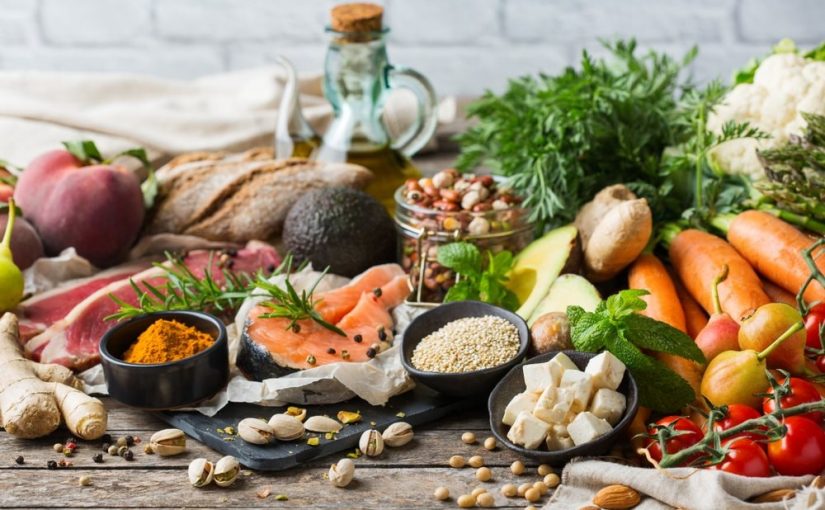Vegetarian Diet and Colon Cancer: Does it lower your risk ?
Colorectal Cancer is the top 5 leading causes of cancer death in the majority of the world. The term describes either colon cancer, also referred to as large intestine cancer, or rectum cancer, which is cancer of the final six inches of the digestive tract.
There’s no way to prevent colorectal cancer entirely, but there’s a lot you can do to help ward it off, like maintaining a healthy weight, not smoking, drinking alcohol in moderation (if at all), and exercising. A diet is always a top option to avoid any disease. A vegetarian diet and colon cancer in this case is quite helpful.
What happens if Colon cancer is detected early?
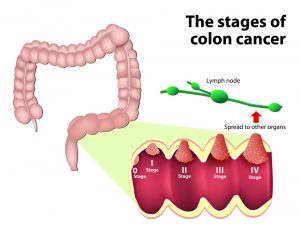
If detected extremely early, colorectal cancer is one of the easiest tumors to treat. Regular testing is crucial for this reason. Beginning at age 50, the National Cancer Institute advises all individuals to get colonoscopies, with follow-ups every ten years or more frequently if your risk for cancer is higher. Colon cancer screenings should start before age 50 for anyone with a parent or sibling who had the disease.
Studies from around the world:
For the study, scientists at Loma Linda University in California looked at the eating habits of close to 70,000 people. Comparing a vegetarian diet to a non-vegetarian diet, the risk of colon cancer was decreased by 22%.
Vegetarians who included fish in their diet showed an even greater risk decrease, 43%, from their diet. Pescatarian diets are vegetarian diets that contain fish and other seafood. In many traditional meals from cultures all over the world, fish pairs nicely with a variety of vegetables, whole grains, pulses, and soy foods.
According to Dr. Edward Giovannucci, a professor of nutrition and epidemiology at the Harvard T.H. Chan School of Public Health, vegetarian diets may lower insulin and insulin-like growth factors, two hormones linked to colon cancer, when compared to the standard American diet.
Vegetarian Diet and Colon Cancer:
A component of red meat or the cooking method likely promotes the spread of colorectal cancer. This is especially true of processed red meats. Consuming more plant-based foods increases your intake of healthy nutrients including fiber, calcium, and folate, which may help prevent colorectal cancer.
What about the enhanced protection attributed to fish consumption?
The omega-3 fatty acids found in fish may have anti-inflammatory properties. Fish is one of the few naturally occurring dietary sources of vitamin D. While a vegetarian diet has many positive characteristics, it may be poor in this vitamin, according to Dr. Giovannucci. A lower risk of colon cancer has been associated with higher vitamin D intake.
So that question arises, what is the Best Diet for Colon Cancer prevention?
The best diet happens to be the Vegetarian diet and Colon Cancer can be kept at bay. According to research, your diet can have a significant impact on your chance of getting colorectal cancer. A recent study also demonstrates that the best defense against colorectal cancer appears to be a diet high in fruits, vegetables, and seafood in moderation.
Pesco-Vegetarian Diet:
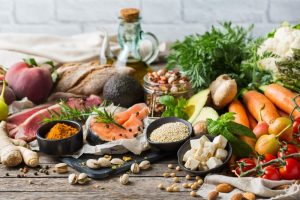
A Pesco-Vegetarian diet, which consists primarily of fruits, vegetables, and a moderate quantity of fish, is linked to a 45% lower risk of colorectal cancer than diets high in meat, according to a study published in the journal JAMA Internal Medicine.
They discovered that compared to non-vegans, vegans had a 16% decreased risk for all colorectal malignancies. Vegans abstain from all animal-derived foods, including dairy products like cheese, milk, and eggs.
In addition, eating meals with a lot of fiber has been associated with a lower risk of colon cancer. According to researchers, this could be because fiber tends to give your digestive system more weight, which reduces the amount of time waste takes to pass through the colon.
According to surgeons, a rich fiber diet reduces the likelihood that carcinogens may harm the intestinal cells because this waste frequently contains them. Surgeons also point out that fruits and vegetables are commonly available and, for the most part, delicious sources of fiber, though any sources would be beneficial.
Mediterranean Diet:
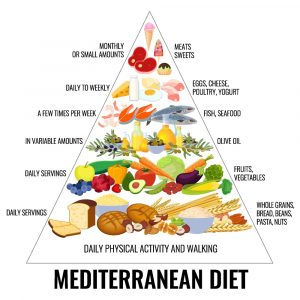
Among its many health advantages for the body are a reduction in blood sugar and cholesterol. Even the symptoms of hemorrhoids are helped by them. They “speed up the gastrointestinal tract’s passage of waste materials via the colon.” The results of the study showed that, in comparison to a non-vegetarian diet, a Mediterranean-style diet decreased the risk of colorectal cancer by 43%.
The Mediterranean diet places a strong emphasis on whole grains, legumes, nuts, and olive oil in addition to fish, fruits, and vegetables. It simply reinforces what we have learned over time. A very healthy diet is the Mediterranean Diet, according to some scientists. It prevents us from getting conditions including heart disease, colon and rectal cancers, and other illnesses.
Low residue diet for Colon cancer:
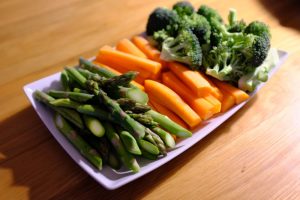
You might have been instructed to consume little or no fiber as part of your treatment. This may be done while you are undergoing chemotherapy, waiting for surgery, trying to lower your risk of bowel blockage, or trying to alleviate symptoms like discomfort or cramping. A low-fiber diet should only be followed on the recommendation of your medical staff. A vegetarian diet and colon cancer also help.
Dietary fiber is the component of fruits, vegetables, and cereal goods that does not break down in the body and can assist give our stools more weight. A low-fiber diet aims to lessen the amount of food that enters our stools undigested since huge bits of unbroken food may become lodged in a small area.
Following a low-fiber diet may have been suggested to you before surgery or after the development of an ileostomy. If your bowels are susceptible to obstruction, you might have received advice to adopt a low-fiber diet.
A low-fiber diet can lower stool volume and slow the rate at which food moves through the intestines. This may facilitate the passage of feces through a constricted area of the bowel. The diet may also lessen the possibility of obstruction and symptoms like pain.
A low-fiber diet still has some fiber in it. To assist prevent constipation when eating a low-fiber diet, you must consume enough fluids. You should try consuming 8 to 10 glasses (1.5 to 2 liters) of fluid daily. This can include water, tea, coffee, squash, fizzy drinks, and smooth juices.
There is no fiber in foods like meat, fish, poultry, eggs, cheese, milk, smooth yogurt, oils, and butter; they can be consumed routinely. It is ideal to have a regular eating schedule and consume a variety of foods throughout the day, particularly fruits and vegetables. Try to limit the number of fruits and vegetables you eat at each meal.
Note: Avoid consuming big amounts of food or liquids all at once if you have a bowel obstruction risk; doing so may alleviate your symptoms. Try a low-fiber and vegetarian diet and colon cancer can be put at bay.
What diet is a major risk for Colon cancer?
The risk of colon cancer could be significantly reduced with just a few minor dietary adjustments! Most of the time, the flavor is prioritized over nutritional value when choosing meals. The Vegetarian diet and Colon cancer are proven to be effective in reducing the risk.
But some of the food are risk foods that can cause cancer to grow or help the cancer cells to get nutrition are:
Fats:
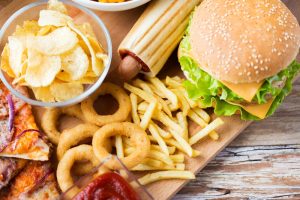
While there are certain “healthy fats,” such as those found in avocados and almonds, a high-fat diet full of fast food and saturated fats can be harmful to your colon. Researchers found that high-fat diets increase the production of intestinal stem cells, which can result in intestinal cancers.
According to the study, eating a lot of fat increases body mass by 50% and increases the risk of developing intestinal cancers.
Red Meats:
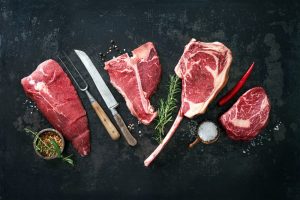
According to studies, consuming too much red meat can raise your risk of developing colon cancer. Red meat eating results in the body’s release of substances that can prevent the repair of genetic material.
You don’t have to become completely vegetarian, but the more vegetables you can incorporate into your life, the better. Plant-based diets have been demonstrated to have the lowest risk of colorectal cancer.
Alcohol:

Alcohol is harmful to seven different types of cancer, not just the colon. It can be enjoyable to occasionally indulge in a drink but remember that excessive alcohol consumption is linked to an increased risk of colon and rectum cancer.
Moderate to heavy alcohol consumption is associated with 1.2- to 1.5-fold increased risks of cancers of the colon and rectum compared with no alcohol consumption
Sugar:

Sweet snacks and sweets are among the most dangerous things you may eat for your health because they’re simple to grab and difficult to resist. The use of sugary snacks may increase your risk of colorectal cancer, according to strong evidence.
Scientists confirmed that soft drinks, cakes, cookies, and chips were all linked to an increased risk of developing cancer after comparing the diets of 2,063 individuals with colon cancer and 2,776 healthy patients.
Colon Cancer Medications:
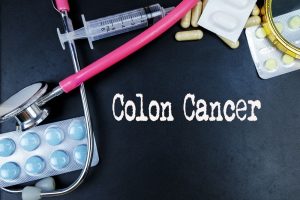
With the vegetarian diet and colon cancer on the other side, the use of medicine also came into play. Since diet alone cannot be helpful. Medication with proper dosage also helped. One such medicine is Xeloda that is used to treat colon cancer.
Since then, the usage of Xeloda has expanded to many off-label uses, such as the neoadjuvant treatment of rectal cancer and the management of advanced or metastatic colon cancer.
Xeloda may be used alone or in combination with other drugs. Xeloda is a member of the antineoplastic, antimetabolite medication class. It works by stopping or slowing the cancer-causing cells.
Retaliate Against Cancer:

You cannot pick your genes, but you can select your diet and way of life. We frequently believe in error that we do not influence whether or not cancer will affect us; it often feels as though this heart-breaking disease comes without warning.
While it’s true that some cancers can strike suddenly, there are many things we can do to enhance our long-term health and lower our risk of contracting many different types of cancer. You can give your body all it needs to combat colon cancer by putting the correct foods on your plate.
FAQs:
Does diet high in antioxidants cause colon cancer?
No, there is no significant association found.
What is the relationship between diet and the development of colon cancer?
Red and processed meats, animal fats, and sugar are the main food components that cause inflammation in the body and may increase the risk of colon cancer.
How does a high fiber diet reduce Colon cancer?
Through increased stool bulk, dilution of fecal carcinogens, and shortened transit time, a high-fiber diet may reduce the risk of colorectal cancer by minimizing the interaction between carcinogens and the lining of the colon.
How does a high fat diet affect colon cancer risk?
The quantity and proliferation of intestinal stem cells are directly affected by a high-fat diet (HFD), which raises the risk of colorectal cancer (CRC). In recent studies, it has been found that blocking fatty acid oxidation can lessen the development of intestinal tumors caused by a high-fat diet.
How does diet affect gut microbiome and Colon cancer?
The diet helps in regulating the immune system and in turn, activates the fighting mechanism in the gut and can kill the carcinogens and keep colon cancer at bay. In this way, a vegetarian diet and colon cancer are proven to be the foe to each other.

